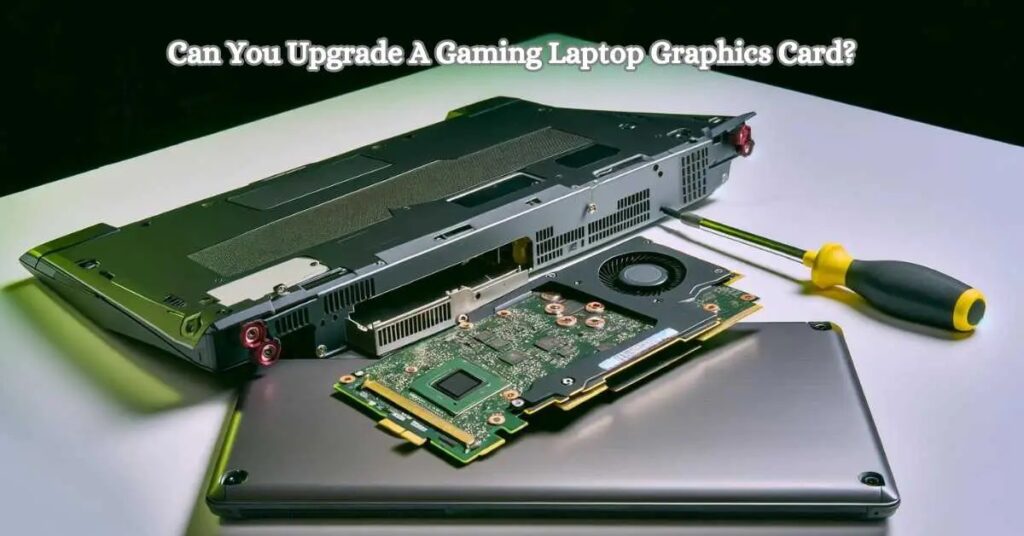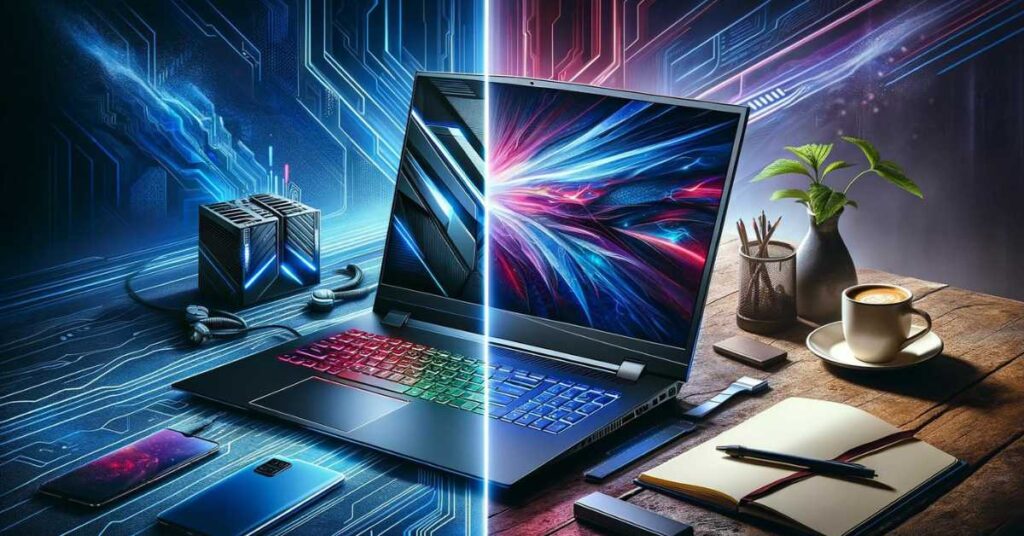Gaming laptops are specialized for high-performance gaming and graphics-intensive tasks, featuring powerful CPUs, GPUs, and faster refresh rates compared to regular laptops. However, they tend to be more expensive and less portable due to their focus on performance over battery life and portability.
In this discussion, we will delve into the intriguing debate of “Are Gaming Laptops Better Than Regular Laptops?” comparing these two types of laptops across various dimensions. We’ll explore their performance capabilities, usability in different scenarios, and overall cost-effectiveness. This comparison aims to shed light on which laptop type offers the most value to users, whether you’re a hardcore gamer, a professional seeking a powerful work machine, or someone looking for a versatile device for everyday use. Join us as we navigate through the nuances of gaming and regular laptops, helping you make an informed decision tailored to your needs.
Section 1: Understanding the Basics
When diving into the world of laptops, it’s essential to distinguish between two primary categories that cater to different user needs: gaming laptops and regular laptops. This distinction is not just about branding but involves significant differences in specifications, performance, and intended use. Let’s break down what sets these two apart, making it easier for you to understand their unique characteristics.

Definition of Gaming Laptops vs. Regular Laptops
- Gaming Laptops: Designed with high-performance gaming in mind, these laptops are equipped with top-tier graphics cards (GPUs), faster processors (CPUs), and more RAM to handle intensive gaming sessions. They often feature high-refresh-rate displays for smoother gameplay and may include RGB lighting and other gaming-centric aesthetic touches.
- Regular Laptops: Also known as general-purpose laptops, these are tailored for everyday use, including browsing the internet, using office applications, streaming videos, and light gaming. They prioritize a balance between performance, battery life, and portability, often utilizing integrated graphics and energy-efficient processors.
Key Differences in Specifications and Performance
1. Graphics Processing Unit (GPU):
- Gaming laptops: Equipped with dedicated GPUs from series like NVIDIA GeForce RTX or AMD Radeon RX, offering powerful rendering capabilities for demanding games and creative work.
- Regular laptops: Typically use integrated graphics solutions, such as Intel UHD or Iris Xe, sufficient for basic tasks and light gaming.
2. Central Processing Unit (CPU):
- Gaming laptops: Feature high-performance CPUs with more cores and threads, ensuring smooth gaming and multitasking.
- Regular laptops: Opt for CPUs that balance performance and energy efficiency, suitable for everyday tasks.
3. Memory (RAM) and Storage:
- Gaming laptops: Start with higher base RAM (16GB or more) and offer options for fast SSDs to reduce game load times.
- Regular laptops: Often come with 4GB to 8GB of RAM and a mix of SSDs or HDDs, catering to general usage needs.
4. Display:
- Gaming laptops: Boast displays with higher refresh rates (120Hz, 144Hz, or higher), providing smoother visuals for fast-paced games.
- Regular laptops: Focus on resolution and color accuracy, with refresh rates typically at the standard 60Hz.
5. Build and Portability:
- Gaming laptops: Tend to be heavier and bulkier due to cooling requirements and the inclusion of high-performance components.
- Regular laptops: Aim for a lightweight and slim profile, emphasizing ease of transport and battery life.
6. Battery Life:
- Gaming laptops: Often have shorter battery life due to the power-hungry components.
- Regular laptops: Are engineered for longer battery life, making them ideal for on-the-go use.
Understanding these differences is crucial when choosing between gaming laptops and regular laptops. Whether you’re a hardcore gamer needing the raw power of a gaming laptop or a casual user seeking the versatility of a regular laptop, knowing what each offers ensures you make an informed decision that aligns with your computing needs and lifestyle.
Section 2: Performance and Gaming
The gaming experience on a laptop is profoundly influenced by the device’s hardware capabilities. This section delves into whether gaming laptops are indeed superior to regular laptops for gaming purposes by comparing their graphics, processing power, and memory. Additionally, we explore the realm of gaming on a normal laptop, discussing its limitations and possibilities.
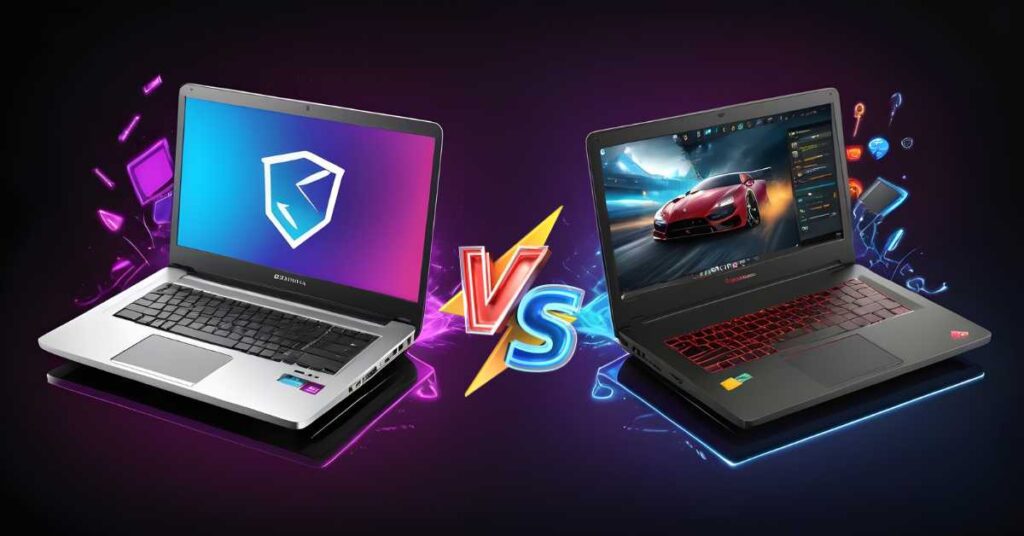
Are Gaming Laptops Better Than Regular Laptops for Gaming?
Graphics, Processing Power, and Memory:
- Graphics: Gaming laptops are equipped with dedicated graphics cards, such as the NVIDIA GeForce RTX or AMD Radeon RX series, which are crucial for rendering high-definition games smoothly. Regular laptops, with their integrated graphics, cannot match this level of graphical fidelity and frame rates.
- Processing Power: The CPU in gaming laptops is designed to handle intense gaming sessions, offering higher core counts and faster clock speeds. This ensures games and demanding applications run without a hitch. Regular laptops, while capable of processing everyday tasks efficiently, may struggle with the computational demands of modern games.
- Memory: Gaming laptops typically start with 16GB of RAM, which is essential for running games and multitasking with ease. Regular laptops usually come with 4GB to 8GB of RAM, which is adequate for general use but may fall short in gaming scenarios.
Gaming laptops are unequivocally better suited for gaming than regular laptops, thanks to their superior graphics, processing power, and memory. These components work in tandem to deliver an immersive gaming experience that regular laptops cannot replicate.
Normal Laptop for Gaming: Limitations and Possibilities
While gaming laptops are the go-to for serious gamers, what about gaming on a normal laptop? Here’s what you need to know:
Limitations:
- Integrated graphics in regular laptops are not designed for intensive gaming, leading to lower frame rates and reduced graphical details.
- The CPU may not be as robust as those found in gaming laptops, potentially causing performance bottlenecks in more demanding games.
- Limited RAM can hinder gameplay, affecting multitasking capabilities, and leading to longer loading times.
Possibilities:
- Casual Gaming: Normal laptops can handle older titles and less demanding games quite well, offering a satisfactory gaming experience for casual gamers.
- Cloud Gaming: Services like NVIDIA GeForce Now or Microsoft Xbox Cloud Gaming allow you to stream games from powerful servers, bypassing the hardware limitations of your device.
- Upgrades: Some regular laptops allow for RAM and storage upgrades, which can slightly improve gaming performance.
While normal laptops face limitations in hardcore gaming scenarios, they still offer possibilities for casual gaming and cloud gaming services. For those who occasionally indulge in gaming, a regular laptop might suffice, provided expectations are adjusted accordingly.
In summary, gaming laptops are designed with the specific needs of gamers in mind, offering superior performance across graphics, processing power, and memory. However, for those whose gaming needs are more modest or who prioritize portability and battery life, exploring gaming on a normal laptop, especially through cloud gaming, presents a viable alternative.
Section 3: Work and Productivity
In the evolving landscape of remote work and digital nomadism, the choice between a gaming laptop and a regular laptop for work purposes becomes increasingly pertinent. This section explores the suitability of gaming laptops for professional environments, their multitasking and productivity capabilities, and how they can double as powerful desktop replacements.
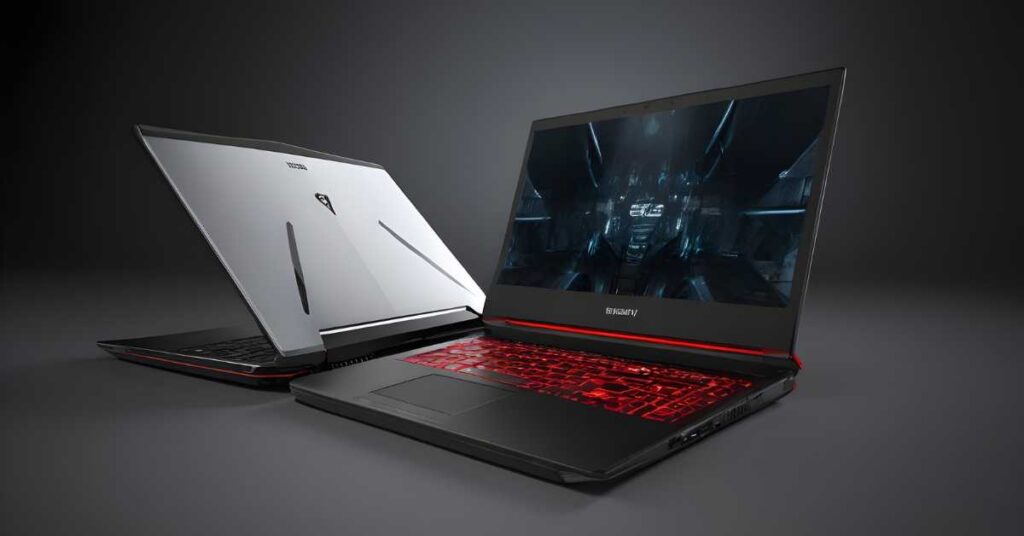
Are Gaming Laptops Better Than Regular Laptops for Work?
Multitasking and Productivity Capabilities:
- High-Performance Hardware: Gaming laptops come equipped with high-end CPUs and ample RAM, facilitating smooth multitasking and efficient handling of resource-intensive applications like video editing software, 3D modeling tools, and large databases.
- Dedicated Graphics Cards: The dedicated GPUs in gaming laptops are not only beneficial for gaming but also enhance performance in graphic design, video editing, and software development tasks that can leverage GPU acceleration.
- Cooling Systems: The advanced cooling systems in gaming laptops ensure that they remain cool under heavy loads, preventing thermal throttling and maintaining optimal performance during long work sessions.
For professionals whose work demands the utmost in processing power, graphics capabilities, and multitasking efficiency, gaming laptops can indeed be better than regular laptops. Their high-performance components ensure that demanding tasks are handled with ease, making them a suitable choice for work.
Use Gaming Laptop as Desktop
How Gaming Laptops Serve as Powerful Desktop Replacements:
- Connectivity Options: Gaming laptops often feature a wide range of ports, including HDMI, USB 3.0/3.1, Thunderbolt, and Ethernet, allowing for easy connection to external monitors, storage devices, and networking resources, much like a traditional desktop setup.
- Performance: With components that rival or even surpass those found in many desktop PCs, gaming laptops can handle nearly all the tasks a desktop can, from intensive computing operations to high-end gaming, without compromise.
- Portability: Unlike desktops, gaming laptops offer the flexibility to work from anywhere without sacrificing performance. This portability makes them ideal for professionals on the go, freelancers, and anyone who appreciates the ability to work from different locations.
Gaming laptops can effectively serve as desktop replacements, offering the dual benefits of desktop-level performance and the portability of a laptop. For individuals seeking a single device that combines the power of a desktop with the flexibility of a laptop, a gaming laptop is an excellent choice.
In summary, when it comes to work and productivity, gaming laptops offer significant advantages over regular laptops, thanks to their superior hardware, multitasking capabilities, and the ability to serve as powerful desktop replacements. Whether for professional use, creative endeavors, or general productivity, gaming laptops provide the performance and versatility needed to excel in a wide range of tasks.
Section 4: Portability and Battery Life
One of the most critical considerations for laptop users is the balance between portability and battery life. This is especially true when comparing gaming laptops with normal laptops, as the difference in battery life can significantly impact usability in various scenarios. Let’s delve into the nuances of gaming laptop vs normal laptop battery life and the inherent trade-offs between performance and battery longevity.

Gaming Laptop vs Normal Laptop Battery Life
Key Factors Influencing Battery Life:
- Hardware Requirements: Gaming laptops are equipped with high-performance components, including powerful CPUs, dedicated GPUs, and high-refresh-rate screens, all of which demand more power than the components typically found in normal laptops.
- Battery Capacity: While gaming laptops may have larger batteries to compensate for their increased power consumption, the high-performance hardware often negates this advantage, resulting in shorter battery life compared to normal laptops.
- Energy Efficiency: Normal laptops are designed with energy efficiency in mind, utilizing integrated graphics and lower-power CPUs that extend battery life, making them more suitable for all-day use without needing a recharge.
Analyzing the Trade-off Between Performance and Battery Life:
- Performance: Gaming laptops offer unparalleled performance, capable of running demanding applications and games at high settings. This performance comes at the cost of higher power consumption, which directly impacts battery life.
- Battery Life: Normal laptops prioritize battery longevity, offering users more time away from power outlets. This makes them ideal for users who need a laptop for work, study, or entertainment throughout the day without worrying about recharging.
- Use Case Consideration: The choice between a gaming laptop and a normal laptop often comes down to the user’s primary needs. If performance for gaming or resource-intensive tasks is paramount, a gaming laptop is the way to go. However, for users who value portability and longer battery life for general use, a normal laptop will be more appropriate.
The decision between a gaming laptop and a normal laptop hinges on the user’s specific needs. Gaming laptops excel in performance but often fall short in battery life, making them less ideal for users who need a device that can last all day on a single charge. On the other hand, normal laptops offer the advantage of longer battery life at the expense of raw performance, catering to users who prioritize efficiency and portability.
In essence, understanding the trade-off between performance and battery life is crucial when choosing between a gaming laptop and a normal laptop. By considering your primary use cases and requirements, you can select a device that best aligns with your lifestyle, whether it’s for high-end gaming, productivity, or everyday use.
Section 5: Cost Considerations
When it comes to setting up a gaming station or choosing a work laptop, cost is a significant factor that influences decision-making. This section delves into the financial aspects of choosing between a gaming PC and a laptop, and explores why gaming laptops might be cheaper than business laptops, offering insights into the price differences and what constitutes the best value for money.
Gaming PC vs Laptop Price
When evaluating the cost implications of setting up a gaming environment, it’s crucial to compare gaming PCs and laptops directly. Below is a table that outlines key cost considerations for both options, helping to illuminate the differences in initial investment, upgradability, and overall value for money.
| Feature | Gaming PC | Gaming Laptop |
|---|---|---|
| Initial Cost | Higher due to the cost of high-end components and peripherals. | Lower initial cost but higher cost per performance unit. |
| Performance | Superior performance due to more powerful components. | Good performance, slightly lower due to thermal and space constraints. |
| Upgradability | Highly upgradable. Individual components can be replaced or upgraded. | Limited upgradability. Mostly confined to RAM and storage upgrades. |
| Portability | Not portable. Requires a dedicated space. | Highly portable. Designed for gaming on the go. |
| Long-term Value | Potentially more cost-effective over time due to the ability to upgrade. | Less cost-effective due to limited upgradability and the potential for obsolescence. |
The choice between a gaming PC and a laptop hinges on individual preferences and needs. If maximum performance and the flexibility to upgrade are key, a gaming PC might offer the best value. For gamers who value the ability to play anywhere, a gaming laptop is a worthwhile investment, despite the higher cost per unit of performance.
Why Are Gaming Laptops Cheaper Than Business Laptops?
Exploring Price Differences and Reasons:
- Target Audience and Use Case: Gaming laptops are designed with a specific target audience in mind—gamers. Business laptops, on the other hand, cater to professionals and often incorporate features like enhanced security, durability, and enterprise-grade software solutions, which can drive up the cost.
- Build Quality and Materials: Business laptops frequently use premium materials and are built to withstand the rigors of travel and professional environments, contributing to their higher price. Gaming laptops focus on performance, which can sometimes mean compromises in build quality or materials to keep prices lower.
- Software and Licensing: Business laptops often come with pre-installed professional software suites and operating systems that include additional features for enterprise use. These software licenses can significantly increase the cost of business laptops.
While gaming laptops can be expensive, they are often priced lower than business laptops due to differences in target audience, build quality, and included software. Business laptops command a higher price due to their premium build, enterprise features, and professional software, offering value in durability and security that is essential for business users.
In summary, cost considerations between gaming PCs, gaming laptops, and business laptops vary widely based on performance needs, portability, and professional requirements. Understanding these differences can help consumers make informed decisions that align with their budget and needs, ensuring they get the best value for their investment.
Section 6: Versatility and Everyday Use
In the diverse world of laptops, understanding the versatility and practicality of gaming and regular laptops for various tasks is crucial. This section explores whether a regular laptop can be used for gaming and assesses the suitability of gaming laptops for everyday use, providing a balanced view of their capabilities beyond their primary functions.
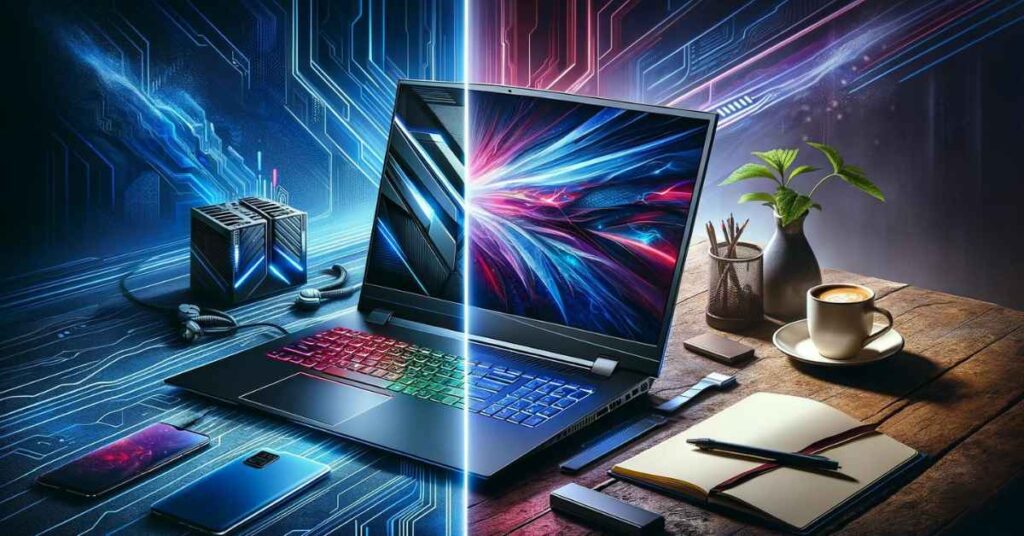
Can a Regular Laptop Be Used for Gaming?
Exploring the Limitations and When It’s Feasible:
- Hardware Capabilities: Regular laptops typically come with integrated graphics and mid-range CPUs, which can handle older games or less demanding titles at lower settings. The gaming experience may not be optimal, but it is certainly feasible for casual gaming.
- Thermal Management: One of the significant limitations of regular laptops when gaming is their cooling systems, which are not designed for the sustained high performance required by most modern games. This can lead to thermal throttling, reducing performance to manage heat.
- Battery Life: Gaming on a regular laptop can drain the battery quickly due to the increased power consumption. It’s advisable to play while plugged in to avoid running out of battery mid-game.
While a regular laptop can be used for gaming, it’s essential to manage expectations regarding game performance and settings. Casual and older games can run satisfactorily, making regular laptops a viable option for light gaming.
Are Gaming Laptops Good for Everyday Use?
Discussing the Practicality of Gaming Laptops for Non-Gaming Tasks:
- Performance: The high-performance hardware in gaming laptops, such as powerful CPUs and ample RAM, ensures smooth operation for everyday tasks, from browsing and office applications to video editing and graphic design.
- Portability and Battery Life: While gaming laptops are generally heavier and have shorter battery life than regular laptops, recent advancements have led to more portable designs and improved energy efficiency. This makes them more practical for everyday use than ever before.
- Versatility: Gaming laptops are equipped with a range of ports and high-quality displays, making them suitable for a variety of tasks, including multimedia consumption, content creation, and even as makeshift workstations.
Gaming laptops are not only capable of handling everyday tasks but excel at them, thanks to their superior hardware. The trade-off in portability and battery life is increasingly mitigated by newer, more efficient models, making gaming laptops a compelling option for users seeking a single device that can handle both work and play.
In summary, both regular and gaming laptops offer a degree of versatility that extends beyond their primary functions. Regular laptops can cater to casual gaming needs, while gaming laptops provide the power and performance required for a wide range of everyday tasks. Understanding the capabilities and limitations of each can help users choose a laptop that best fits their lifestyle and needs, ensuring satisfaction and productivity in both gaming and non-gaming scenarios.
Section 7: Comparisons with Other Platforms
Choosing the right platform for gaming and general use involves weighing the benefits and drawbacks of laptops and desktops. This section provides a detailed comparison of laptops and desktops in the context of gaming, alongside an exploration of the pricing dynamics between gaming laptops and desktops.
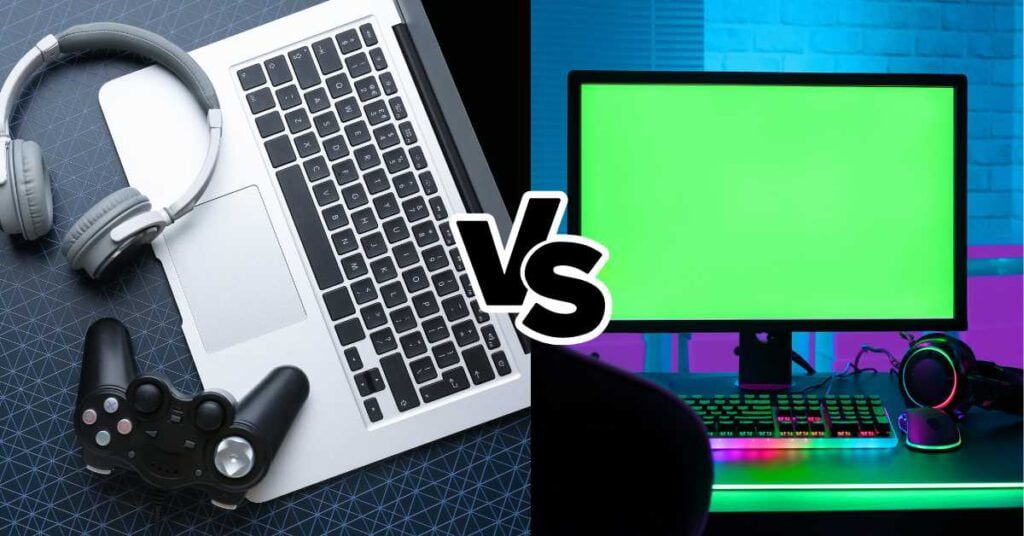
Laptop vs Desktop for Gaming
To provide a clear comparison, let’s examine the pros and cons of each platform in a table format:
| Feature | Laptop | Desktop |
|---|---|---|
| Portability | High (easy to move and use in different locations) | Low (stationary, not meant for easy movement) |
| Performance | High (but can be limited by thermal throttling and power constraints) | Very High (top-tier performance with better cooling solutions) |
| Upgradability | Limited (most components are integrated and not easily replaceable) | High (easy to upgrade individual components like GPU, CPU) |
| Cost | Higher (premium for portability and compact design) | Lower (more performance per dollar, especially at high-end) |
| Customization | Limited (pre-built with little room for customization) | Very High (can be built and customized to exact specifications) |
| Space Requirement | Low (compact and requires less space) | High (requires more space for the tower, monitor, and peripherals) |
| Power Consumption | Lower (designed for efficiency) | Higher (performance components consume more power) |
The choice between a laptop and a desktop for gaming hinges on the user’s priorities. If portability and space-saving are key, a gaming laptop is the way to go. However, for those who prioritize performance, upgradability, and cost-effectiveness, a desktop remains the superior choice.
Gaming Laptops Cheaper Than Desktops?
When and Why This Might Be the Case:
- Initial Cost vs. Total Cost: While gaming laptops can initially seem more expensive than desktops, the total cost of ownership for a desktop can be higher when factoring in the need for peripherals (monitor, keyboard, mouse) and a high-quality speaker system, which are all integrated into a laptop.
- Technological Advances: Advances in technology have made gaming laptops more affordable, narrowing the price gap with desktops. Economies of scale in manufacturing and the increased demand for portable gaming solutions have contributed to this trend.
- Performance Needs: For gamers whose needs are met by mid-range hardware, gaming laptops can offer a cost-effective solution without the need for the high-end components that typically drive up the cost of gaming desktops.
While gaming desktops generally offer more bang for your buck in terms of raw performance, gaming laptops have become more competitively priced, offering a viable alternative for gamers looking for a balance between performance, portability, and price. The decision should be based on individual needs, preferences, and the specific use case scenarios envisioned by the user.
In summary, the laptop vs. desktop debate for gaming and general use is nuanced, with each platform offering distinct advantages. Understanding these differences and how they align with personal or professional requirements will guide users to make the best choice for their gaming and computing needs.
FAQs: Are Gaming Laptops Better Than Regular Laptops?
1. Can gaming laptops be used effectively for work purposes?
Yes, gaming laptops can be effectively used for work, especially for tasks that require high processing power, such as video editing, 3D modeling, and software development. Their superior hardware makes multitasking and productivity tasks smoother compared to regular laptops.
2. How do gaming laptops fare in terms of battery life compared to regular laptops?
Gaming laptops generally have shorter battery life than regular laptops due to their powerful components, which consume more power. However, advancements in technology are helping to close this gap, with some gaming laptops offering more efficient battery use.
3. Are gaming laptops more expensive than regular laptops?
Gaming laptops can be more expensive than regular laptops due to their advanced graphics cards, processors, and cooling systems. However, the price difference can vary widely based on the specifications and brand. In some cases, gaming laptops may offer better value for money, considering their performance capabilities.
4. Can I use a regular laptop for gaming?
Yes, you can use a regular laptop for gaming, but the experience may be limited by the laptop’s hardware. Lighter games or older titles may run smoothly, but for the latest, graphics-intensive games, a gaming laptop would provide a better experience.
5. Why might someone choose a gaming laptop over a desktop for gaming?
People might choose a gaming laptop over a desktop for its portability, allowing them to game on the go or easily bring their setup to friends’ houses. Gaming laptops also save space and are easier to set up compared to a full desktop gaming rig.
6. Are there any gaming laptops that are good for everyday use?
Many gaming laptops are designed to be versatile, making them excellent for everyday use. They often have robust processing power and high-quality displays, which are great for streaming, browsing, and productivity tasks.
7. What should I look for when choosing the best gaming laptop?
When choosing the best gaming laptop, consider the graphics card, processor, RAM, storage options, display quality (resolution and refresh rate), battery life, and cooling system. Your choice should align with your gaming needs and budget.
8. How do gaming laptops compare to business laptops in terms of price?
Gaming laptops and business laptops can vary greatly in price based on their specifications. While gaming laptops focus on graphics and performance, business laptops prioritize durability, security features, and battery life, which can sometimes make them more expensive than gaming laptops with comparable performance specs.
9. Is it worth using a gaming laptop as a desktop replacement?
Using a gaming laptop as a desktop replacement can be worth it for those who value the combination of high performance and portability. With the right setup, including external monitors, keyboards, and mice, a gaming laptop can offer a desktop-like experience while also providing the flexibility to take your work and play on the go.
10. How does the cost of gaming PCs compare to gaming laptops?
Gaming PCs generally offer more power and upgradability for a lower cost compared to gaming laptops. However, gaming laptops provide the added benefits of portability and space-saving, which may justify the higher price for some users.
Conclusion
Our exploration into “Are Gaming Laptops Better Than Regular Laptops?” reveals that the best choice depends heavily on individual needs and preferences. Gaming laptops offer superior performance for gaming and intensive tasks, while regular laptops provide a balance of functionality and portability for everyday use. Cost-effectiveness varies based on specific requirements and budget constraints. Ultimately, understanding your priorities—whether it’s gaming prowess, work productivity, or general use—guides you to the most suitable option. We encourage you to reflect on how these insights apply to your situation and invite you to share your thoughts or experiences in the comments section.

